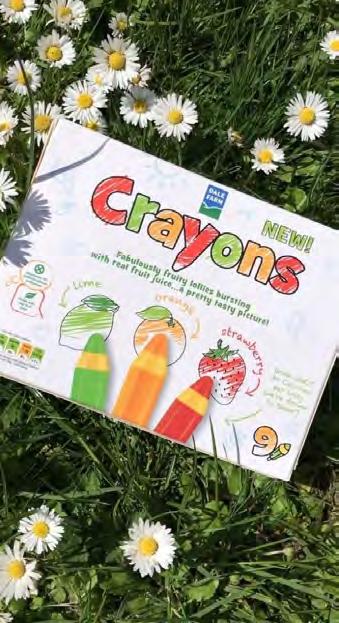
22 minute read
Business Review
Innovation
Innovation remained central to our strategy in 2019/20, with the development of new Dale Farm consumer branded products, new own label products, ingredient opportunities and several process innovation projects.
Advertisement
Throughout the year, the Group launched 32 new products and introduced 72 product variants. We rejuvenated 21 existing products, incorporating some 90 variants. Overall, it has been a busy period for the business, with 162 new and rejuvenated products delivered throughout 2019/20.
New consumer products introduced included several ice cream lines such as Dale Farm Joker ice cream tub and Dale Farm Crayons as well as the launch of a new Mullins gourmet range. Own label activity was particularly strong during the year in yogurts, custard and spreads.
An important development was the optimisation of our in-line cheese standardisation system, which was installed in early 2018. This has led to sustained improvement in cheddar making yield and consistency.
Following on from development work on WPC80 whereby we added the functionality of heat stability, we went on to develop new heat stable WPC35 and WPC30 products. Other new ingredient product developments included vitamin enriched skimmed milk powder (SMP) and fat-filled milk powder (FFMP) for use in animal feed applications in the UK. Throughout the year, the Group launched 32 new products and introduced 72 product variants. We rejuvenated 21 existing products, incorporating some 90 variants. Overall, it has been a busy period for the business, with 162 new and rejuvenated products delivered throughout 2019/20.


Commercial & Operations
CHEESE
Dale Farm’s Cheese business had another strong year in terms of output, performance and investment. Production output was at record levels, which helped drive reduced costs as well as further yield improvement. Our overall cheese volume increased by 12%. The key drivers of this volume growth were retail and ingredients channels, which grew by 17% and 4% respectively.
Our partnerships with the UK’s two fastest growing grocery retailers continue to drive the retail side of our business. Our total volume across both retailers grew by 18%, in a cheddar market that grew at 4%.
The popularity of cheddar cheese across Europe does not appear to be diminishing. Indeed, volume across our Lidl Export retail business has trebled, as consumer demand increases. With the recent addition of the US and Serbia markets, we are now supplying Lidl with our cheddar into over 30 countries worldwide.
Our LEAN manufacturing improvement programme continued to progress across our Ash Manor and Dunmanbridge sites. By reducing nonproductive downtime, we have delivered our highest ever annualised bulk cheese output and cheese yields have benefited.
We were proud to successfully convert the Dunmanbridge site to natural gas from heavy fuel oil in 2020. Not only has this has reduced the site’s environmental emissions, it has also reduced costs through the lower gas cost per kWh.
BEVERAGES & CREAM
The retail Beverages business has had a strong year. Branded beverages performed well ahead of expectations thanks to new business secured within the convenience channel. This growth cemented the Dale Farm brand as the clear market leader in milk and cream in Northern Ireland.
Sales volumes across the retail sector were in line with forecast, whilst sales in foodservice showed impressive growth. The growing consumer appetite for hot beverages ‘on the go’ continued, boosting sales in the coffee shop sector. Doorstep milk sales continued to decline, with distributor attrition running at approximately 12% per annum.
Branded and own label consumer cream sales were ahead of forecast by almost 16%, with sales boosted through substantial growth in foodservice. Retail packed cream sales were also ahead of forecast, with a particularly strong performance by Dale Farm brand, thanks to increased distribution in the convenience sector.
Our drinks sales continued to grow ahead of expectations. Strong promotional activity on take home multipacks across the retail sector boosted numbers to 1.7% ahead of forecast.
Operational efficiency was consistent throughout the year at Pennybridge. Costs and yields were improved through our effective LEAN programme. Investment in site packing and processing enabled an upgrade on filling and process capacity for custard and cream leading to a significant new business win. As a result, custard sales were trebled this year. Work continued on depot rationalisation, improving site efficiency and boosting profitability overall.
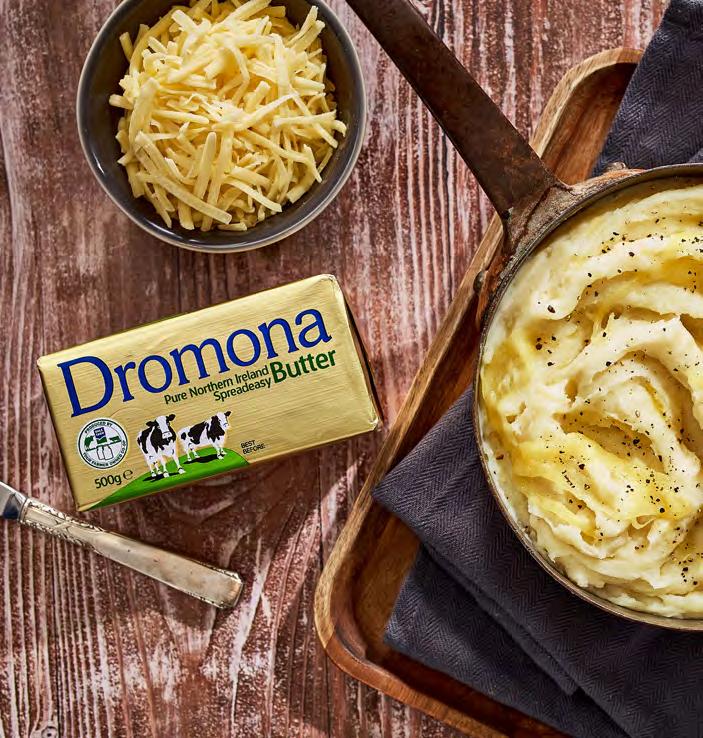
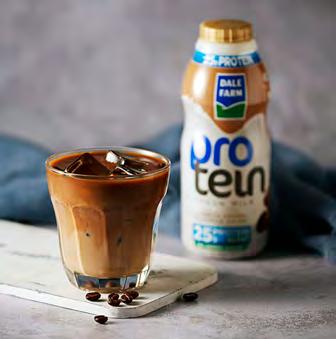

BUTTERS & SPREADS
Our Butter & Spreads business performed well against the backdrop of challenging market dynamics. Retail butter sales volumes grew significantly and were enhanced by new own label business with a national multiple retailer. Retail branded butter sales increased year on year by over 6%, reflected in market share gains in both volume and value.
Foodservice butter sales volumes were slightly behind last year as we ceased business with low commercial returns. However, sales of butter portions during the year grew considerably and were ahead of forecast.
Spreads sales performed exceptionally well, elevated by new business gained in the food ingredients sector. Retail sales were in line with expectations, with the Dromona brand performing well ahead of the market.
The Dromona site benefited from increased operational investment. An effluent plant upgrade futureproofed our environmental compliance, boosted volume capacity and set the business unit up for significant long-term growth. FRESH PRODUCTS
Our Fresh Product business, which includes yogurts, yogurt drinks, cottage cheese, fermented creams and desserts performed ahead of last year. The business achieved top line growth of 11% driven by several new product launches during the year.
Shopper and consumer behaviours continue to evolve in this dynamic category with a continued demand for healthier products, reduced use of plastic and improved packaging recyclability. In response, we launched several kefir based products targeted towards gut health, we reduced our packaging content, increased recyclability and reduced sugar across a number of our products. The business also continued to expand its yogurt portfolio, achieving strong growth in the layered gourmet category.
Our refreshed look for Rowan Glen and Spelga yogurts performed in line with expectations. Our product quality continues to improve and is increasingly being used as a benchmark for the market.

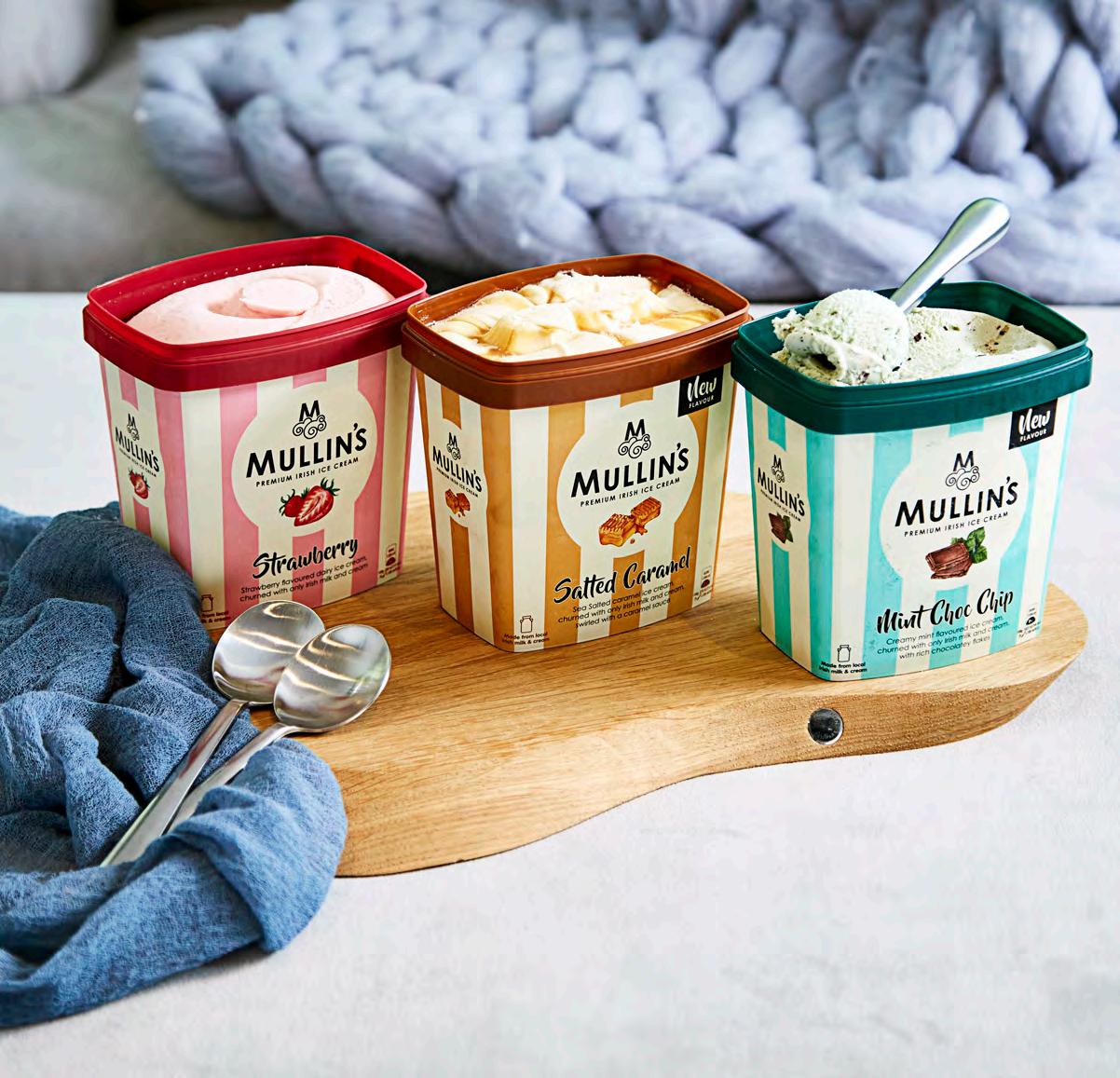
ICE CREAM
The Dale Farm Ice Cream business had a challenging year due to poor weather over the key summer period. The ice cream market declined by 12% in the 12 months to March 2020 and this impacted all brands. However, the Dale Farm brand continued to grow market share in both the NI and RoI markets.
In NI, Dale Farm became the number 1 brand in value and volume in the impulse market. In RoI, the Dale Farm brand grew by 9% year on year, with all other ice cream brands in decline.
Mullins Ice Cream sales were behind the previous year, mainly due to the reduction in scoop ice cream sales over the summer. The number of outlets selling Mullins scoop ice cream increased, with 60 new sites secured throughout the year. 10 new ice cream products were launched during 2019/20, including Crayons, a multipack of novelty ice lollies; a limited-edition Joker ice cream tub; two new indulgent Rapture impulse flavours - Salted Caramel and Triple Berry; and new multipacks of the ever-popular Rapture Mint and Honeycomb. Mullins launched the gourmet ‘Ireland’s Favourites’ range, as well as introducing new flavour combinations into the revamped 900ml take home offering.
Dale Farm Ice Cream launched a multimedia marketing campaign to raise brand awareness in the RoI market. The ‘Don’t Overthink It’ campaign ran across national radio, digital screens, Spotify and social media. We also hit the road for the second year of our Big Summer Road Trip, bringing our ice cream van to events across Ireland.


POWDERS
Powder and whey markets remained volatile during 2019/20. The uncertainty of Brexit, currency volatility, African Swine Flu, trade disputes between China and the USA and, in the final quarter, the COVID-19 pandemic, all influenced returns in both the whey protein and milk powder markets.
SMP started the year at €1,900/T, trending higher for most of the year, peaking at €2,650/T before falling back suddenly to €1,800 in March 2020. High protein whey protein concentrate (WPC) had a relatively stable year in comparison to recent years, with a range of no more than €1000/T over the period, from a high €5,500/T to a low of €4,500/T.
We increased our customer base through new business in the UK, Europe, USA, India and China, adding additional customers for WPC30 and WPC35 as well as WPC80. We developed sales of our innovative Low Lactose & Heat Stable WPC80 and entered the USA market with sales of grass-fed WPC80.
Agri-Division
MILK SUPPLY
Milk supplies from members were ahead of the previous year for each of the 12 months throughout 2019/20. This signalled the second consecutive year of month on month growth in our milk pool. The increase was driven by further expansion of our membership, with 28 new entrants and three new suppliers joining Dale Farm. The average amount of milk produced per member increased by 5.4% to 675,770 litres. 22 members retired from milk production.
The overall increase of 5.3% in milk production from our producers significantly increased the amount of milk produced in NI, which rose to an estimated 2.4 billion litres, up 1.7% from 2.36 billion litres in 2018/19.
During the year, 83% of Dale Farm producers’ milk was used in-house by Dale Farm, with milk sold externally to only one outlet.
The base milk price paid to members was relatively consistent, beginning the year with an April price of 25.5ppl. The price fell slightly during the next six months before peaking at 26.25ppl for October, November, and December, when the winter bonus is included. A further softening of the markets in the New Year saw the price ease back to finish at a base price of 23.75ppl in March 2020, when the effects of COVID-19 began to impact the dairy sector.
Thus, over the 2019/20 year, the average base milk price paid by the Cooperative was 25.13ppl. However, the average milk price paid to farmers was 27.26ppl. This difference of 2.13ppl shows the value of milk quality premiums and bonuses, as well as the benefit received from fixed milk price schemes during the year. FARM SERVICES
Our Farm Liaison team had a busy year assisting members with milk quality issues, preparing for Red Tractor farm audits, attending member meetings, and handling general queries.
Encouragingly, the number of positive tanker rejections for antibiotic failures decreased by 40%, following a 30% drop the previous year. This reflects the efforts of our members in addressing this issue.
Somatic Cell Counts (SCC) rose slightly during the year, while the Bactocount average remained the same. For the second consecutive year, the butterfat and protein content of milk increased, which resulted in a 25 year high for milk protein and the second highest recorded figure for butterfat.
The Farm Liaison team was delighted to be able to assist 28 new members into dairy production during the 2019/20 year and to welcome three new suppliers from other processors. The team conducted a series of on-farm hygiene workshops in conjunction with Tankcare, Dale Farm’s laboratory manager and Deosan.
Red Tractor accreditation continues to be an essential element of Dale Farm’s strategy to develop our retail sales in GB and to meet the requirements of liquid milk customers locally. The scheme, pioneered by Dale Farm in Northern Ireland, has now become a standard for quality assurance in the local market, as other processors have followed suit in requiring their suppliers to be accredited. It is important for Dale Farm’s team and members to work together to maintain this accreditation, as customers increasingly look for traceability and compliance right through the supply chain.
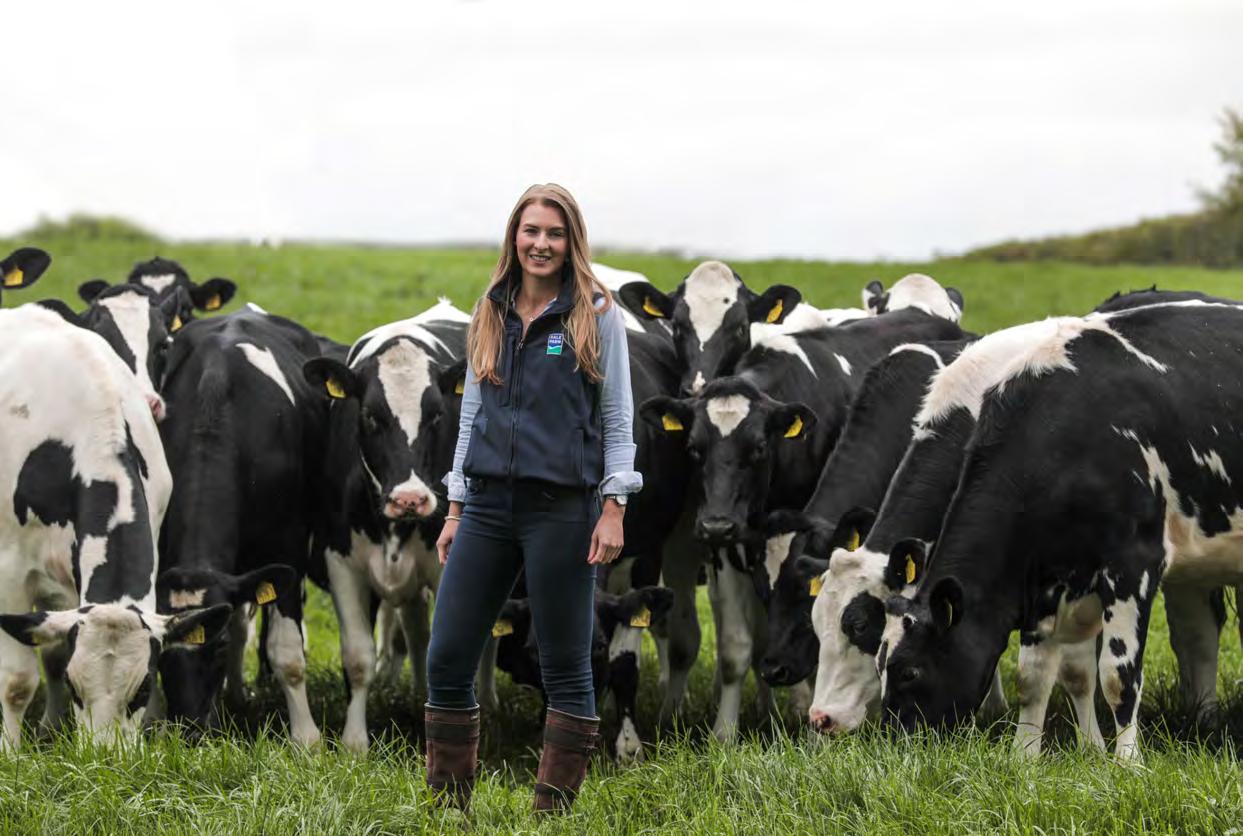
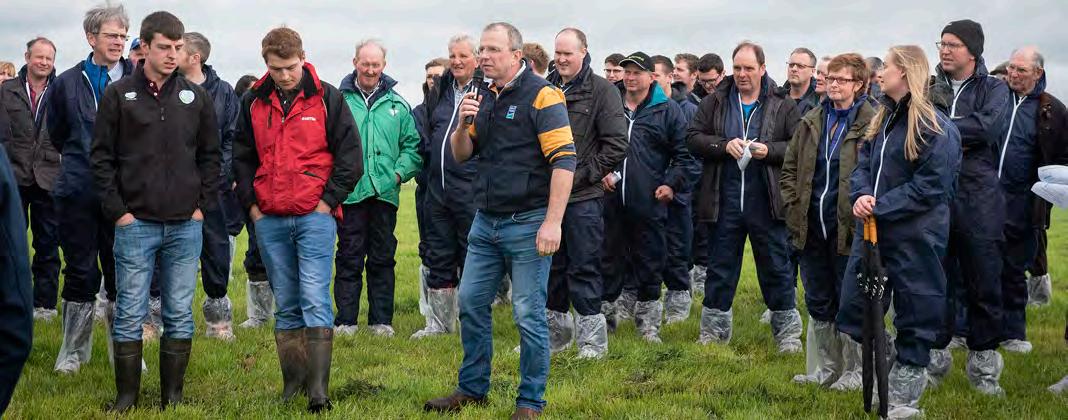
Image: Dale Farm Director Harold Johnston and sons hosted an Agrisearch farm walk, April 2019
The costings programme launched in the 2018/19 year in conjunction with Kingshay Consulting is beginning to yield significant benefits. 160 members now submit monthly figures to receive additional information around farm profitability and financial sustainability. They receive feedback on their annualised figures and can now develop action plans to focus on areas for improvement. When combined with data from Dairy Herd Management, this service provides a powerful benchmarking tool for Dale Farm members. A soil analysis pilot study was rolled out to 33 of these farmers during the winter, with subsequent farm nutrient management plans drawn up and presented to participants.
A new development was the launch of Horizon, a calf to beef scheme in conjunction with ABP. This provides a fully integrated supply chain model from birth to slaughter, with a focus on paying a premium for selectively bred Aberdeen Angus calves from the dairy herd. The target for the first year is to have 2,000 calves within the project and there has already been sufficient interest from around 50 farms to achieve this. PRODUCER SERVICES
Rising milk volumes and a steady stream of new entrants saw another strong year’s trade in the sale of new and second-hand farm milk tanks. Tankcare, in partnership with Flogas, continued to promote the sales of new water heating systems using liquid petroleum gas (LPG). These have proven to be a cost-effective solution for those looking to update their water heating systems and an attractive proposition for many new entrants.
We rolled out a campaign to promote the benefits of the Tankcare maintenance contract, which resulted in new customers. A new management structure within Tankcare has also refocused our emphasis on stock management and system processes, which is already proving valuable.
New members were also attracted to Dairy Herd Management, with farmers keen to acquire management information that will help them improve efficiency. The increasing need to reduce antibiotics on farms has stimulated demand for regular SCC figures, as farmers aim to incorporate selective dry cow therapy into routine herd management.
Successful advertising campaigns and on-farm fertility workshops have resulted in a significant rise in the number of PregCheck samples undertaken. During the year, Red Tractor announced it will be incorporating a Johne’s risk assessment into their accreditation programme in the latter half of 2020. This has helped increase the demand for Johne’s testing as producers are keen to get information on their current herd status. This can then be used in the one to one discussions with their vet, during the risk assessment, to develop management practices that reduce the spread of the disease and implement control measures to assist with biosecurity.
The use of technology continues to be of increasing importance, particularly to the younger generation of farmers as they seek to find solutions that reduce duplication and assist with herd management. Several well attended IT workshops covering the ‘Your Herd’ programme and ‘Mobile Herd’ App were held during the winter.
SenseHub, the electronic heat detection and cow health monitoring system, continued to be popular for customers looking for an accurate cost-effective solution for day to day fertility and health management. Dairy Herd Management once again recorded strong sales for the Sensehub product across a range of farm types and sizes.
UNITED FEEDS
It was a challenging year for United Feeds as demand for ruminant feed in NI fell by 5%. The dry, mild weather from January through to March 2019 left ground in ideal condition with plenty of grass cover. This allowed an early turnout in all areas which significantly reduced feed demand in the first half of the year.
The good spring and summer weather also ensured there were plentiful supplies of high-quality forage on all farms for the winter months. In addition to the early turnout, the poor profitability in the beef sector saw the demand from large beef finishers decline as the year progressed.
Following several years of operating at full capacity, the expansion of the Dungannon mill was completed. This major investment involved the creation of a new 100 tonnes/hour raw material intake and additional raw material storage bins, the installation of a new grinder and weighers, upgrades to conveyors and elevators, the addition of new finished product bins and a second out loading weighbridge. This doubles the production and storage capacity of the mill and will underpin growth in the years ahead.
In the Belfast mill, a new grinder was installed which, in conjunction with LEAN projects throughout the year, has resulted in significant improvement in finished product quality.
During 2019/20, United Feeds paid out almost £360,000 through the Milk Cheque rebate and the Member Trading Dividend, which pays a dividend of 1% on the purchases of feed and fertiliser by members. This is similar to the previous year in spite of the fall in feed sales and illustrates the commitment of members to trade with the company. Commodity markets started the year with a good harvest in South America, however, the very wet, cold spring experienced in the US saw prices, particularly for maize and a lesser extent soya, rise sharply on fears of reduced production. As the growing season continued, prices eased as crops recovered but remained higher than the previous year.
Locally, prices saw a further spike in March 2020 as logistical issues from the US and South America resulted in a shortage of some materials, and the developing COVID-19 pandemic affected markets. The ongoing trade dispute between the US and China also continued to impact the market.
For a second year running, the NI fertiliser market saw a reduction in demand, in this case by 9%. However, United Feeds recorded increased sales during the year resulting in our highest year of sales to date. We continue to be market leaders locally, with our protected urea range. These products now have a strong record of delivering performance on farm, while at the same time lessening the environmental impact compared to traditional chemical fertilisers. Price of fertiliser remained firm during the spring and summer of 2019, but weakened during the winter by approximately 15%.
The company’s growth continues to be underpinned by innovation in products, feed analysis and feeding programmes. This work has been keenly supported by our members, with 36 participating in the third phase of a major development project around improving milk protein content at farm level and cheese yield efficiency at factory level. Central to our success in these developments are the skills and knowledge of our people. Ongoing training and development programmes ensure we remain at the forefront of the latest research and technical developments, so we can offer the best advice and assistance to our members.
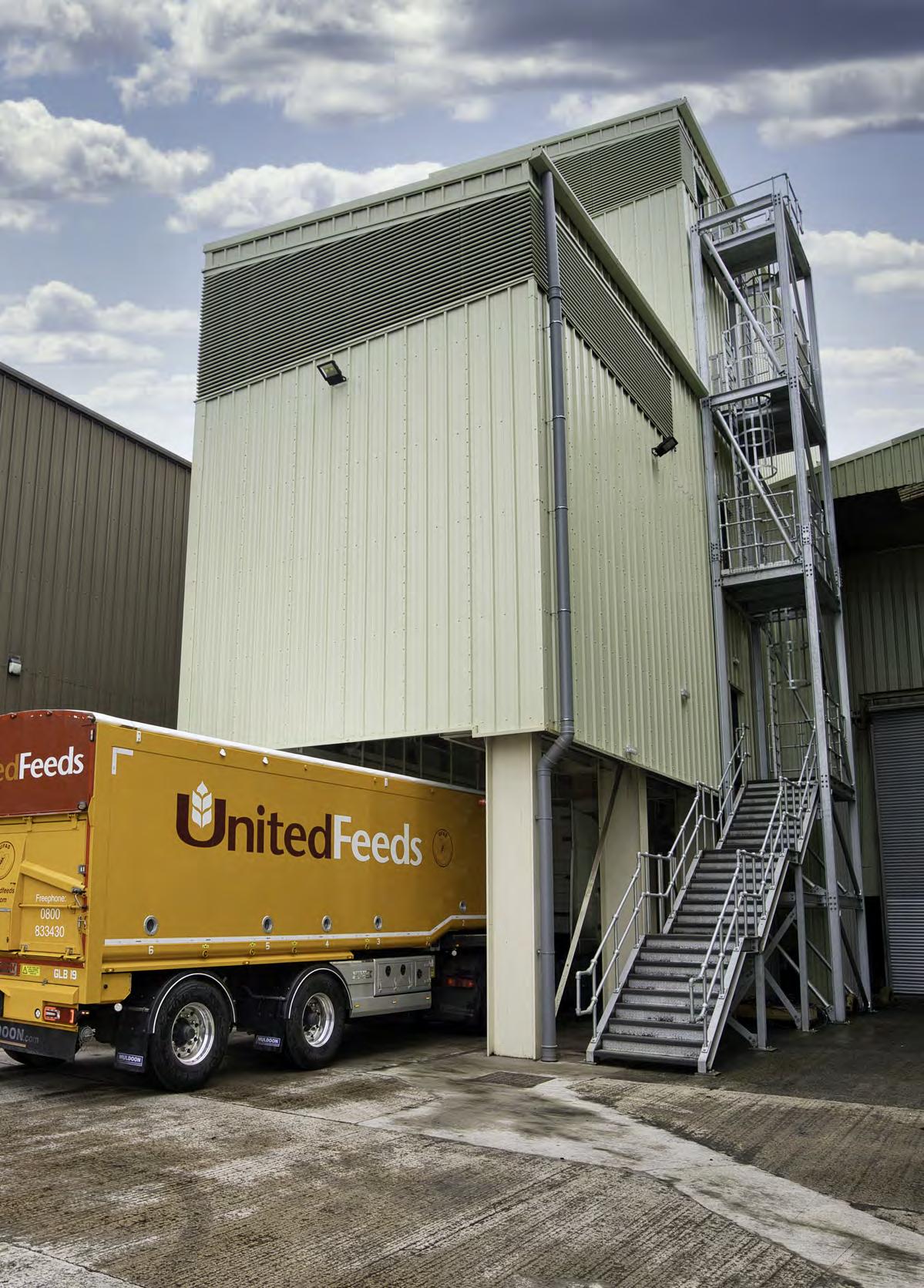
Following several years of operating at full capacity, the expansion of the Dungannon mill was completed. This doubles the production and storage capacity of the mill and will underpin growth in the years ahead.
People & Processes
IT
2019/20 saw the successful conclusion of our unified communications project, with the introduction of both Jabber and WebEx meetings. The timely implementation of these tools played a critical role in the Group’s business continuity plan as COVID-19 began to impact. These platforms facilitated remote working and workplace flexibility, whilst ensuring continued collaboration and effective communication across the business.
We further developed our Warehouse Management Systems (WMS), with the successful implementation of packaging and ingredients stock management in Pennybridge and Dromona. The Dromona site also introduced WMS for bulk and retail inventory, becoming the first site in the Group with full stock management on WMS.
We initiated a new project to move users e-mail accounts from on-premise to a cloud-based Exchange. This solution provides scalability, improves disaster recovery contingency and removes the need for future hardware upgrades. The migration of all users within the Group was completed by August 2020.
In addition, the Group took further steps to enhance our disaster recovery capabilities through improved use of new cloud solutions supported by appropriate test plans.
2019/20 also saw the implementation of further functionality within our Enterprise Resource Planning (ERP) system, Microsoft Dynamics NAV, to help with immediate process improvements. Top Image: As part of LEAN process, Mullins Team benchmark Dunmanbridge’s daily performance reviews. Bottom Image: Our 2019 Future Leaders Graduation Day after completing a 10 month leadership programme at the William J Clinton Leadership Institute, Queens University Belfast.
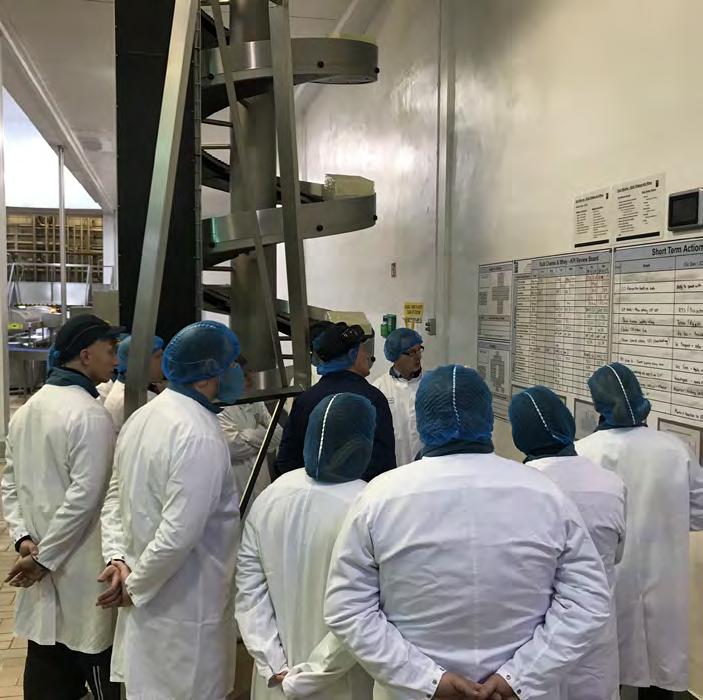

PEOPLE
The talented people throughout our business are the key driver of Dale Farm’s business strategy. We continually invest in critical recruitment and people development to deliver our plans within a positive and progressive working culture.
The total numbers employed across the Group increased from 1,151 in March 2019 to in 1,199 March 2020. The Group has maintained a focus on costs resulting in several restructuring measures being completed in the period. This activity will continue into 2020/21.
2019/20 saw the launch of the Group’s LEAD programme, delivered in partnership with the Irish Management Institute. The programme is aimed at high performing managers and will develop effective leaders in data and critical analysis, self-awareness, converting ideas into action and holistic communication. These leaders will successfully address and navigate the challenges and opportunities inherent in implementing change within Dale Farm. We launched our cloudbased ‘MySay’ employee engagement survey tool and initiated our first full company assessment of staff engagement. The survey provided critical insights into engagement levels in all areas of the business and subsequent action plans have been agreed to address these.
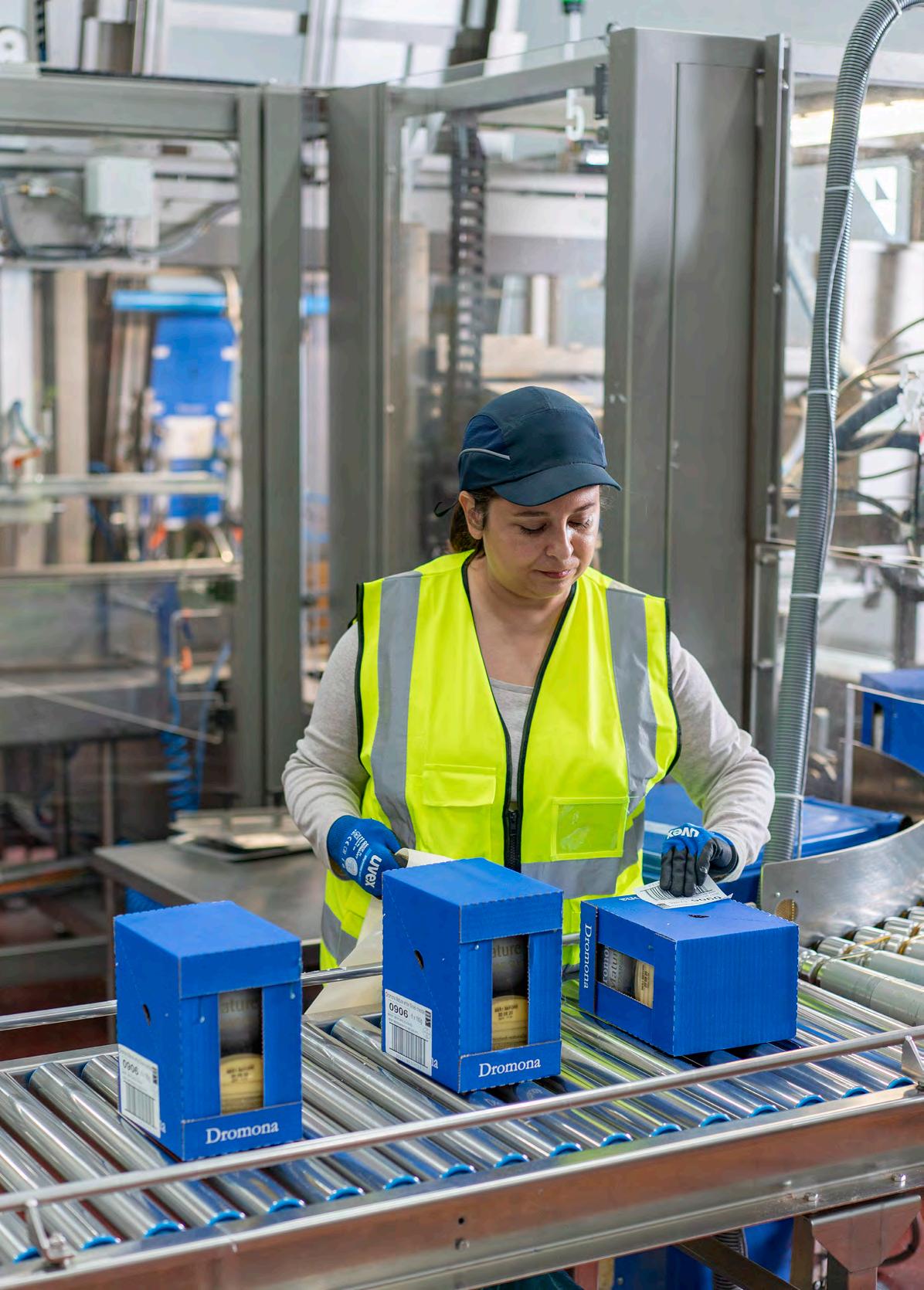
‘Connected,’ our employee smartphone App, was successfully launched during the year, allowing communications to reach employees across the Group effectively and quickly. The App has been well received by our people, with initial high levels of engagement and will be expanded in the coming year to give employees further access to essential items at their fingertips. Connected has been critical in delivering clear, consistent messaging to our teams while they have dealt with the challenges of COVID-19.
The Group has continued to further develop ‘Success Factors’, our Human Resources Management Information System, which now provides managers with robust, real-time reporting data dashboards to support timely decision making and action.
People & Processes
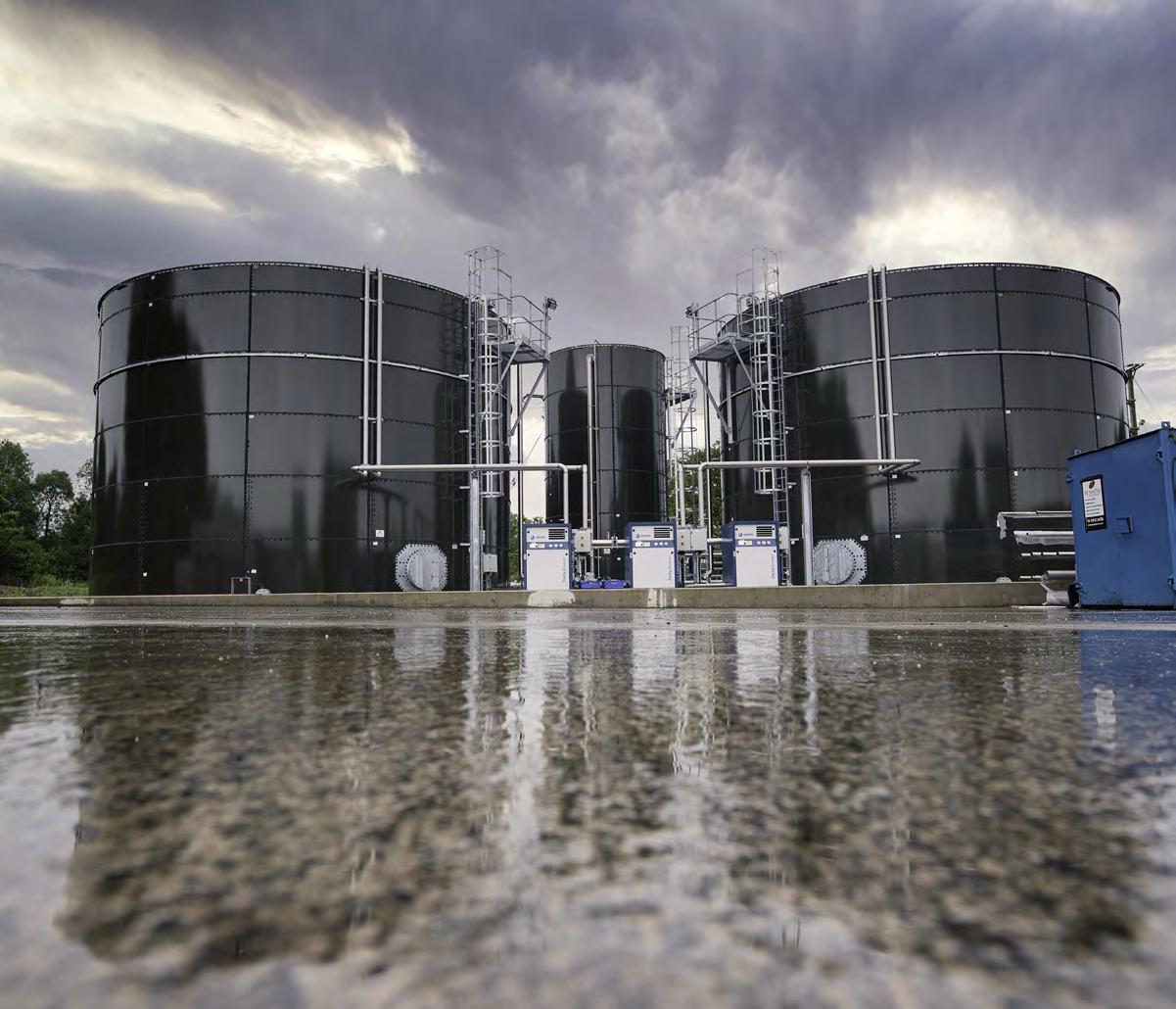
HEALTH & SAFETY
The health, safety and wellbeing of our employees is of utmost priority to Dale Farm, our vision being ‘to create and maintain a safe and healthy working environment for all’. We provide the right leadership to support our safety agenda through appropriate training, risk control, performance management, communication and engagement.
Our safety performance continues to compare favourably with industry benchmarks on health and safety matrices.
The Group has continued to deliver initiatives and training to support our safety plan. In 2019/20, we rolled out the first phase of our new ‘ReWard’ safety training programme aimed at first-line managers. To date, over 40 employees have participated in the programme, and a further 50 will take part in Phase 2. The year saw the completion of several internal training courses including the identification of critical hazards, home working, working at heights, risk assessments and manual handling. Additional safety programmes for technical specialists will conclude in 2020/21.
Environmental
PROSPERITY AGREEMENT
Dale Farm and the Northern Ireland Environment Agency (NIEA) formally signed a Prosperity Agreement. This is a voluntary agreement that contains commitments from both Dale Farm and the NIEA, with the aim of delivering environmental benefits beyond legal requirements, developing a more strategic approach between business and regulator, and helping Dale Farm benefit from environmental improvements.
ISO ENVIRONMENTAL ACCREDITATION
All Dale Farm NI manufacturing sites were successful in maintaining the industry leading environmental ISO 14001 accreditation standard, with recertification audits being successfully completed. ENVIRONMENTAL INFRASTRUCTURE IMPROVEMENTS
The upgrade at Dromona effluent treatment plant was completed and fully commissioned. This enabled Dromona to maintain discharge consent levels while securing the site’s processing capabilities.
At Dunmanbridge, the boiler gas conversion was successfully completed, reducing the site’s carbon dioxide emissions significantly.
Furthermore, a new high efficiency chiller unit was installed at Dunmanbridge and a new high efficiency boiler was installed at Mullins Ice Cream.
Image: Refurbished effluent plant at our Dromona site.
Corporate Social Responsibility
Creating and maintaining a positive environment for our colleagues, members and the communities in which we operate, is part of Dale Farm’s responsibility as a large employer.
Throughout the year, employees once again demonstrated their passion to support local communities and causes through a wide range of fundraising and voluntary activities. At Christmas, employees kindly supplied a variety of gifts and donations in support of Cash for Kids, helping children in our communities. Several fundraising activities were organised in aid of the Welcome Organisation, which helps people who are experiencing, or are at risk of, homelessness. 2019/20 also saw the selection of Cancer Focus as our charity partner for the next two years. Our charity committee will work with Cancer Focus to deliver employee-focused fundraising activities that will promote engagement and wellbeing.
In response to COVID-19, we increased our efforts to support those in need. We partnered with food redistribution charity FareShare Northern Ireland, to provide milk and butter weekly, for onward distribution through community food banks and charities. This helped provide safe, nutritious dairy to vulnerable members of society.
We are a keen member of Arts & Business NI, which connects the arts and business sectors for mutual benefit and remain a committed Corporate Patron for the Prince’s Trust. Dale Farm is also an active member of Business in the Community (BITC) and we are working towards achieving the BITC CORE standard, NI’s only corporate responsibility accreditation. We continue to play a role in the Food and Drink Sector Skills Council’s Tasty Careers campaign, with our ambassadors working closely with schools to provide insights into careers within the agri-food sector. We continue to seek out and identify future talent, providing one-year undergraduate work placements for students across the business, from research and development to finance and IT. We also offer short-term work experience opportunities for GCSE and A-level students as part of their early career journey.
Through continued collaboration with our suppliers, Dale Farm is committed to maintaining a high standard across health, safety, environment, ethics and labour. This commitment is reflected by our internationally recognised Sedex Ethical Trading standard accreditation.
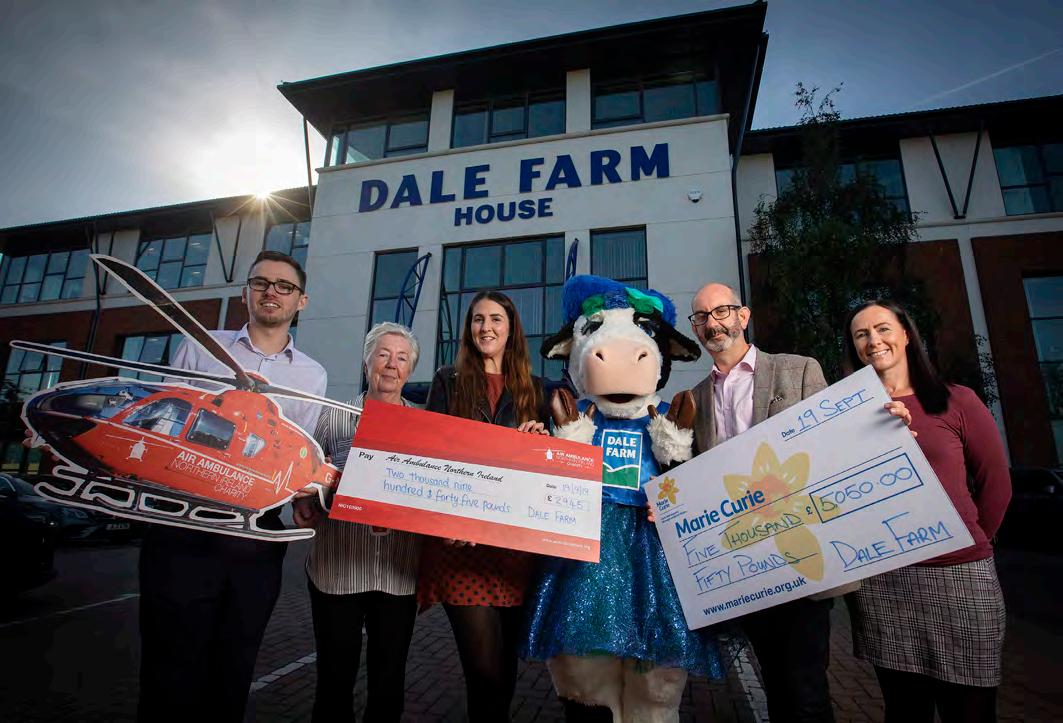
Image: Fundraising initiatives organised by our Charity Committee raised a total of £7,995 during the year, with funds shared between Marie Curie and Air Ambulance NI.






